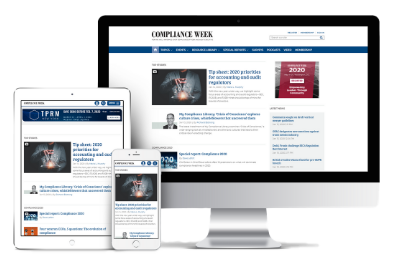- Home
- About CW
-
Topics
- Back to parent navigation item
- Topics
- Accounting & Auditing
- AI
- AML
- Anti-Bribery
- Boards & Shareholders
- Culture
- ESG/Social Responsibility
- Ethics & Culture
- Europe
- Financial Services
- Internal Controls
- Regulatory Enforcement
- Regulatory Policy
- Risk Management
- Sanctions
- Surveys & Benchmarking
- Supply Chain
- Third Party Risk
- Whistleblowers
- Opinion
- Events
- Research
- Awards
-
CW Connect
- Back to parent navigation item
- CW Connect
- Sign In
- Apply
- Membership
Bipartisan data privacy bill seeks to break through Congressional logjam
By  Aaron Nicodemus2022-06-06T18:09:00
Aaron Nicodemus2022-06-06T18:09:00

A bipartisan bill attempting to end the gridlock in Congress over crafting a federal data privacy law was introduced by a pair of Republicans and a Democrat.
Related articles
-
 Premium
PremiumAsk a CCO: What matters most in federal privacy law?
2023-03-03T14:00:00Z By Compliance Week
Four senior compliance practitioners provide their opinions on what a federal privacy law in the United States should strive to accomplish.
-
 Article
ArticleSephora fined $1.2M in first public CCPA enforcement
2022-08-25T18:47:00Z By Adrianne Appel
Cosmetics retailer Sephora agreed to pay $1.2 million in the first public enforcement action under California’s landmark consumer privacy law.
-
 Article
ArticleTwitter agrees to $150M settlement with DOJ, FTC over data privacy lapses
2022-05-26T18:39:00Z By Jeff Dale
Twitter agreed to a $150 million settlement with the Department of Justice and Federal Trade Commission for violating a 2011 administrative order by “misrepresenting” how it used nonpublic user information.
More from Regulatory Policy
-
 News Brief
News BriefEuropean Commission unveils a simpler, more competitive EU Single Market, but businesses remain skeptical
2025-07-03T15:51:00Z By Ruth Prickett
The EU’s new strategy aims to boost SME growth and cut market barriers, but businesses doubt reforms will happen, and consumer groups fear weaker data protections.
-
 News Brief
News BriefFHFA chief orders Fannie and Freddie to consider crypto assets in mortgage assessments
2025-06-26T20:22:00Z By Oscar Gonzalez
In another sign of President Donald Trump’s focus on cryptocurrency, the head of the U.S. Federal Housing Finance Agency (FHFA) ordered Fannie Mae and Freddie Mac to create proposals to consider crypto assets for a single-family home mortgage.
-
 Article
ArticleEU, UK agree to reset rules on agrifoods, mergers and carbon trading as part of post-Brexit reset
2025-06-24T17:21:00Z By Ruth Prickett
Four years after Brexit, the U.K. and EU announced a “reset” that will ease barriers to importing and exporting food, drink, and agricultural produce. It may also harmonize rules around carbon emissions trading systems, simplifying compliance for multinational organizations that are large emitters, and enable more young people to gain ...
- Terms and Conditions
- Privacy Policy
- Do Not Sell My Info
- © 2025 Compliance Week
Site powered by Webvision Cloud



